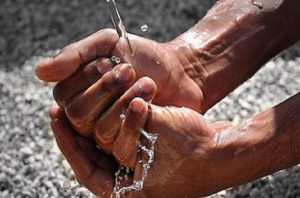By: Sayyid Saabiq
Wudu’ (ablution) means to wash one’s face, hands, arms, head and feet with water.
Part of Islamic law
This is proven from the three major sources of Islamic law:
1- The Qur’an
Allah Says in the Qur’an:
O you who believe, when you rise for prayer, wash your faces and your hands up to the elbows and lightly rub your heads and (wash) your feet up to the ankles. (Al-Ma’idah 5:6)
2- The Sunnah
Abu Hurairah reported that the Messenger of Allah said, “Allah does not accept the prayer of one who nullified his ablution until he performs it again.” (Al-Bukhari, Muslim, Abu Dawud and At-Tirmidhhi.)
3- The Consensus
There is a consensus of scholarly opinion that ablution is part of Islamic law.
Therefore, it is a recognized fact of the religion.
Its Virtues
Many hadiths state the virtues of ablution. We shall mention just a few:
– `Abdullah ibn As-Sunnabiji stated that the Messenger of Allah said, “When a slave makes ablution and rinses his mouth, his wrong deeds fall from it. As he rinses his nose, his wrong deeds fall from it. When he washes his face, his wrong deeds fall from it until they fall from beneath his eyelashes. When he washes his hands, his wrong deeds fall from them until they fall from beneath his fingernails. When he wipes his head, his wrong deeds fall from it until they fall from his ears. When he washes his feet, his wrong deeds fall from them until they fall from beneath his toenails. Then his walking to the mosque and his prayer give him extra reward.” (Malik, An-Nasa’i, Ibn Majah and Al-Hakim)
– Anas reported that the Messenger of Allah said, “If good characteristics exist in a person, Allah makes all of his acts good. If a person purifies himself for prayer, he expiates all of his sins and his prayer is considered an extra reward for him.” (Related by Abu Ya`la, Al-Bazzar and At-Tabarani in Al-Ausat)
– Abu Hurairah reported that the Messenger of Allah said, “’Shall I inform you (of an act) by which Allah erases sins and raises degrees?’ They said, ‘Certainly, O Messenger of Allah.’ He said, “Perfecting the ablution under difficult circumstances, taking many steps to the mosque, and waiting for the (next) prayer after the (last) prayer has been performed. That is ribat. (Malik, Muslim, At-Tirmidhi and An-Nasa’i)
(Ribat is a term that normally denotes guarding the army from enemy attack, which has great reward in Islam. Here the Prophet has likened the waiting for the coming prayer to be ribat)
– Abu Hurairah also reported that the Messenger of Allah, upon whom be peace, passed by a grave site and said, “Peace be upon you, O home of believing people. Allah willing, we shall meet you soon, although I wish I could see my brothers.” They asked, “Are we not your brothers, O Messenger of Allah?” He said, “You are my companions. My brothers are the ones who will come after (us).” They said, “How will you know the people of our nation who will come after you, O Messenger of Allah?” He said, “If a man has a group of horses with white forelocks amidst a group of horses with black forelocks, will he recognize his horses?” They said, “Certainly, O Messenger of Allah.” He said, “They (my brothers) will come with white streaks from their ablutions, and I will receive them at my cistern. But there will be some who will be driven away from my cistern as a stray camel is driven away. I will call them to come. It will be said, ‘They changed matters after you,’ then I will say, ‘Be off, be off.” (Muslim)
_________________________
The article is an excerpt from the author’s translated book “Fiqh Us Sunnah”.
 Arabic
Arabic English
English Spanish
Spanish Russian
Russian Romanian
Romanian Hindi
Hindi Tagalog
Tagalog Bengali
Bengali Sinhalese
Sinhalese Nepali
Nepali


